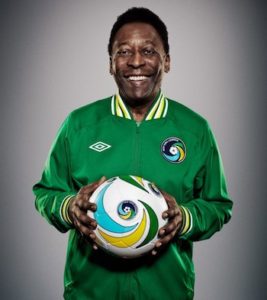
Pelé
Pelé was born on this date in 1940. He was an Afro Brazilian soccer player and international humanitarian.
He was born Edson Arantes do Nascimento in Minas Gerais, Brazil. He was the son of a Fluminense semiprofessional footballer, Dondinho (born João Ramos do Nascimento), and Maria Celeste Arantes.
Pelé grew up in poverty in Bauru, São Paulo. Pelé earned extra money on match days by shining shoes at the Bauru Athletic Club. Taught to play by his father, whose own professional football career with Atlético Mineiro ended prematurely due to a knee injury, he could not afford a proper football and usually played with either a sock stuffed with newspaper, tied with a string, or a grapefruit.
There, he intermittently attended school and performed odd jobs until, while still an adolescent, he began to play for the local youth soccer team. At this time, he acquired the nickname "Pelé," which he is now known worldwide. At 15, Pelé was transferred to Santos, a team in the much larger port city.
Pelé would play for Santos for 18 years and forever become associated with its white number 10 shirt, along with the yellow shirt of the Brazilian national team. During the years that Pelé played at Santos, the club team won numerous state and national championships in Brazil, and in 1962 and 1963 won two world club championships.
During what has been called Pelé's reign, Santos frequently toured throughout the world in front of huge crowds. Fans paid homage to this Black Brazilian in Asia, Africa, and Europe. Concerned that such devotion might result in offers for Pelé to play for teams in richer countries, the Brazilian Congress declared the 22-year-old a "non-exportable national treasure" in 1962. During a visit to Nigeria by the team in 1969, the warring factions in a civil war agreed to a temporary truce lasting the duration of the Brazilian's stay.
Pelé played in four World Cups with the Brazilian national team, figuring in Brazil's unprecedented three victories between 1958 and 1970. Pelé retired from Santos in 1974, but a year later, a multi-million-dollar offer lured him back into the game to play for the New York Cosmos as a North American league attempted to spread soccer to the United States. His second and final retirement came in October of 1977.
He scored his thousandth goal in 1969 while playing in Rio de Janeiro's famous Maracana Stadium, a goal he dedicated to the "children of Brazil." Pelé would ultimately score 1279 goals in 1362 games. Pelé's importance in Brazil is so great that some have claimed he would be elected president if he ever chose to be a candidate. However, despite its Black and Mestizo majority, it has elected only light-skinned presidents. In 1993, President Cardoso appointed Pelé as Minister of Sports. Pelé's fame reached far beyond the confines of Brazil and sports.
Pelé is considered by many to have been the greatest soccer player in the history of the game and was repeatedly chosen as the most outstanding athlete of the twentieth century. He was the first Black man to be on the cover of Life Magazine, for instance, and even more than two decades after his professional soccer career, he is, certainly among the people of African descent, one of the most recognized in the world. Pelé Died on December 29, 2022, 82 years old.